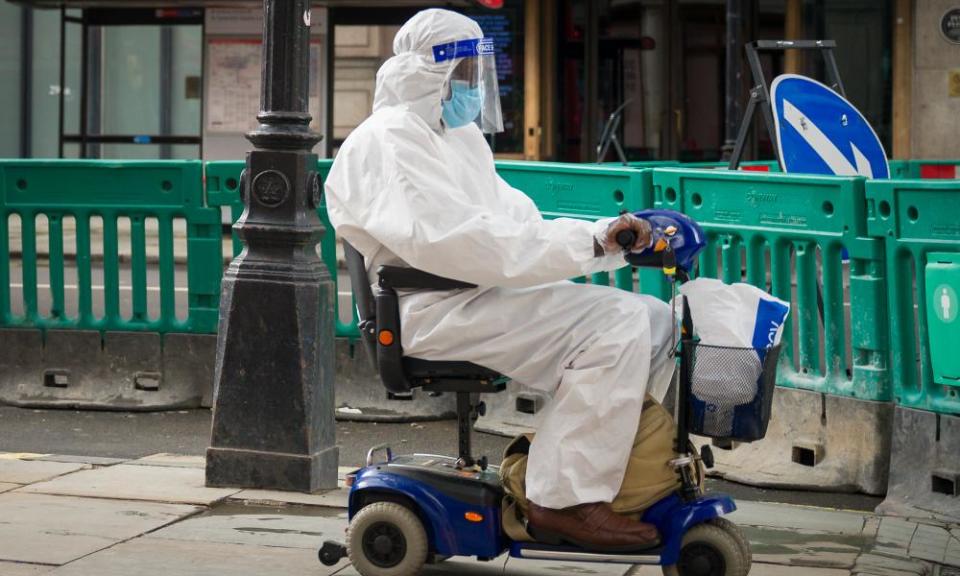'We'll be staying cooped up': shielders air fears as England eases lockdown

As pubs and restaurants in England reopen and people once again head to holiday destinations, some who have been shielding are nervous about what the easing of lockdown will mean for them.
In a small village in south Devon, Mary Heywood and husband Hugh, both 76, don’t think they will leave their home to socialise with others as two local sites reopen to campers and motor homes. “There’s no way we are risking our lives by joining in,” said Mary, who has asthma and other health conditions.
One site is said to be expecting 90 motor homes this the weekend, and people are likely to flock to the local pub and restaurant. “There will be a lot of people around,” Mary said. “We’re not a very big village and I don’t know how we’ll cope with it all.
Related: Coronavirus UK: are Covid-19 cases rising or falling near you?
“We’ve gotten into the habit of not going out anyway. We don’t go shopping, but get home deliveries instead. We’ve become a bit institutionalised in that way. We won’t be going anywhere in July. We’re expecting a spike in new cases in about two to three weeks, which means we’ll definitely be staying cooped up.”
Paul, a police officer in south-east England who is shielding because he has a suppressed immune system due to medication he takes for Crohns disease, acknowledged that shielding people “can’t live in a bubble for ever”, but said he felt apprehensive that restrictions were being eased while Leicester was being put into a second lockdown.
“We’ve seen with Leicester what could happen to other areas,” he said. “I’m not bothered about things like bars opening, and the people I’d make a social bubble with are my family who live on the other side of the country.”
Paul’s main concern is how he can protect his health while returning to work, which is due to happen at the start of August. “How can you social-distance if you’re a frontline officer? Because of your duties as a police officer, especially a firearms officer, there aren’t many office jobs,” he said.
After months of shielding, Paul’s fitness has decreased and he is concerned about whether he will pass fitness tests and how he will cope with the physical demands of work. “I was hoping to keep fit, but I live in a flat, and when I tried to exercise I got complaints from neighbours because of the noise of me bouncing up and down,” he said. “I’ve been going for walks at 5.30am to avoid other people, but until three weeks ago I couldn’t even do that.”
For 27-year-old Natasha Hill, a primary school teacher who has an autoimmune condition, the fear of a second wave has made her hesitant to embrace the easing of restrictions.
“It was so hard to adjust to going into lockdown in the first place. I’m a very independent person, my illness has never affected my day-to-day life before, so it took me months to adjust to that change,” she said. “I think [lots of shielding people] have adjusted to how life is at the moment, but if we got freedom and then were told it was over, that would be worse.”
Hill said that because of her age, many people assumed she was not at high risk from the virus and so did not socially distance around her. She is concerned that easing the restrictions for shielding people, and the wider reopening this weekend, could make people more complacent.
“I’m only 27 and I have no obvious signs of illness or disability,” she said. “I go to extreme lengths to avoid others but they don’t even acknowledge that they should. When I go out with my parents who are in their 60s, people really make an effort, they even cross the street, but they’re both healthy and I’m actually at a higher risk.
“At the start, people were making sure they were following the rules. Now that shops and pubs are reopening, many people are thinking that life has gone back to normal, because for a lot of people who aren’t vulnerable it has. But the more life goes back to normal, the harder it becomes for [shielding people] to go back to normal. We so want it to, but it can’t.”
James Foley, 70, said that after shielding for so long, the easing of restrictions was daunting. While the risks posed by coronavirus constituted a large part of his concern, his worries around returning to normal life had “to a certain extent gone beyond that”.
“I’ve gotten into the habit of being in my little cell here, almost being a hermit, and it’s harder and harder to break out of that,” he said. “It’s a difficult thing to describe, but after shielding for a long time I’ve lost confidence in going out. I really miss people. Being on your own for a long time does have an impact on your psychological wellbeing and confidence. It’s partly rational and partly irrational.”
Foley said he could not trust the government’s guidance on when it was safe for shielding people to alter their behaviour, as he felt it had handled the pandemic extremely poorly.
“I feel badly that the mortality rate has been unnecessarily high, and I’m concerned there isn’t more public outrage about it,” he said. “Trust is something that has to be earned, it isn’t there of right. I’m very concerned when people like Iain Duncan Smith want reducing the social distancing to 1 metre for economic reasons. It doesn’t seem to be supported by medics.”
Foley said he would take things at his own pace, following his own restrictions and “risk assessments”.

